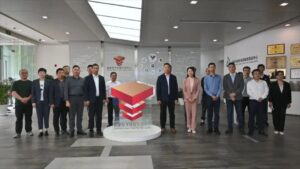✽Sim Chu Sa
Two years ago, Yangpu Hi-Tech Entrepreneurial Service Center (Yangchuang) signed a "gentleman's agreement" with Wujiaochang Street to provide free entrepreneurial services to the small and medium-sized enterprises stationed in the street. Taking such a thankless job?
Now, the contract with Yangchuang has been extended to seven streets, from which seven nurseries and hundreds of startups have grown up, which means the future for the 18-year-old incubator.
Service model radiates to the street
In 1997, Shanghai established the first state-run incubators, and Yangchuang, with a 6,000-square-meter old workshop, was among them.
After that, Yangchuang started to practice hard, and enlivened the entrepreneurial atmosphere by introducing entrepreneurial mentors, holding seminars and forums, and giving lectures in colleges and universities, etc. Yangchuang's incubation plants became hard to find.
Just in the incubator to do "landlord" can also live quite moist, Yang created the service "sent" to the Wujiaochang street. Wujiaochang street party secretary Yu Xiang recalled that the street did not have a special service enterprise institutions, but to register in this enterprise, what kind of growth depends entirely on their own, Xie Jihua came, they put more than 50 enterprises one by one signed to him, "someone to work for you for free, who does not like?".
Some people are happy, some are sad, Yangchuang employees were in a mood, and had to run more than 50 companies for nothing, what was Xie singing about? Xie Jihua reassured everyone by saying, "Radiating our ready-made service model to the streets is just a matter of having more pairs of chopsticks at dinner."
Under Xie Jihua's insistence, the entrepreneurial services provided only for the companies in the incubator began to "spill over" to the streets.
Break the "ceiling" to keep going.
In 2005, Yangchuang completed the transformation of the business into an enterprise, which is operated according to the enterprise procedure, and the operating income is a matter of survival.
The state incubator income mainly comes from rent, as a "landlord" will always hit the ceiling, the state can not take out unlimited incubation land, Yang Chuang's two incubator buildings have been "stuffed" full, where is the future growth of the business?
The incubator's customers should be the government. The incubator to accept government-purchased services, service content in the "food, drink, laxative" level to upgrade, the range of services is not limited to the incubator, the community needs entrepreneurial service places need to accept this "overflow" service.
In 2009, he began to do business nursery, incubation sites in the street, just as Yangpu District is carrying out "three districts linkage", business nursery development is flourishing, and now almost It has become the "standard" for incubators.
Shegeworthy said: "The 'spillover' of services has raised the energy of our brand by several levels and we have gained a lot of opportunities from it, even though the services are free."
Be a full chain supplier of innovation and entrepreneurship
With a number of different forms of innovation and entrepreneurship organizations have been recognized as new incubators, the old state-run incubators are no longer the days of collecting rent on an acre of land, in the face of bold, new ideas, live service competitors, Yangchuang's transformation path can be called a sample of the transformation of incubators with government background. It is revealed that as early as 2008, Yangchuang's service income has exceeded real estate income, and in 2013, it reached the scale of 1 billion yuan capital and 100,000 square meters incubation area.
In the same way as the new incubators, Xie Jihua also takes the improvement of service quality as a grip to achieve the goal, because in the Internet era, general information transfer services can no longer meet the needs of enterprises, innovation and entrepreneurship services must be more professional. To this end, Xie Jihua is training his staff to become professional investors and managers, who need to be skilled at memorizing government innovation and entrepreneurship policies, as well as knowing how to connect with different levels of the capital market.
When asked how to position Yang Chuang, Xie Jihua thought about it and said, "We come from an incubator background and want to be a supplier for the whole chain of innovation and entrepreneurship in the future."




